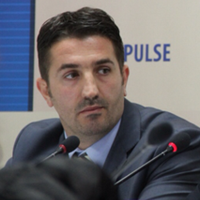Atdhe Hetemi (Kosovo 2018) received an MA in International Relations from the ISES-Corvinus MA program Kőszeg. He is a PhD candidate at the University of Ghent, Belgium. He was a founder and leader of Public Pulse research and policy projects at the UNDP Kosovo office. He has a decade-long combined experience in academic institutions and international organizations. He has authored papers and delivered lectures on the topics of political and institutional stability from public perspective, advocacy, good governance and development, the contemporary history and politics of the Western Balkans.
Topic: Social Movements Between Demands for Social Change, Justice, and Nationalism (1960)
The paper that will be developed at iASK, is a part of Atdhe Hetemi’s PhD research. Whereas the focus of his thesis is examining the impact of the students (1968 – 1997) in the mobilization of the masses to demonstrate for countercultural causes. During his field work conducted in the Balkan region (2015, 2016 and 2017), he gathered archival and interview materials. The sources were collected from the Archives of Kosovo, Albania, Yugoslavia, Serbia and National Libraries in Tirana and Prishtina. Whereas the interviews were conducted in Prishtina, Tirana, Belgrade and Skopje with activists, academics, politicians and other officials that participated in, influenced or have in-depth knowledge of the student movements. This paper will compare the main goals and approaches of the student movements which took place during the 1960s and are considered as revolutionary acts aiming to create a better world through challenging the existing norms at the times. Specifically, the countercultural student movements in the United States and Western Europe in the 1960s, will be compared with the student movements in the Socialist Federal Republic of Yugoslavia (SFRY) and Kosovo, in particular. Based on his research so far, Mr. Hetemi is prepared to argue that, depending on the geo-political circumstances, the student demands varied between dominant tendencies for social changes, justice and nationalism.

